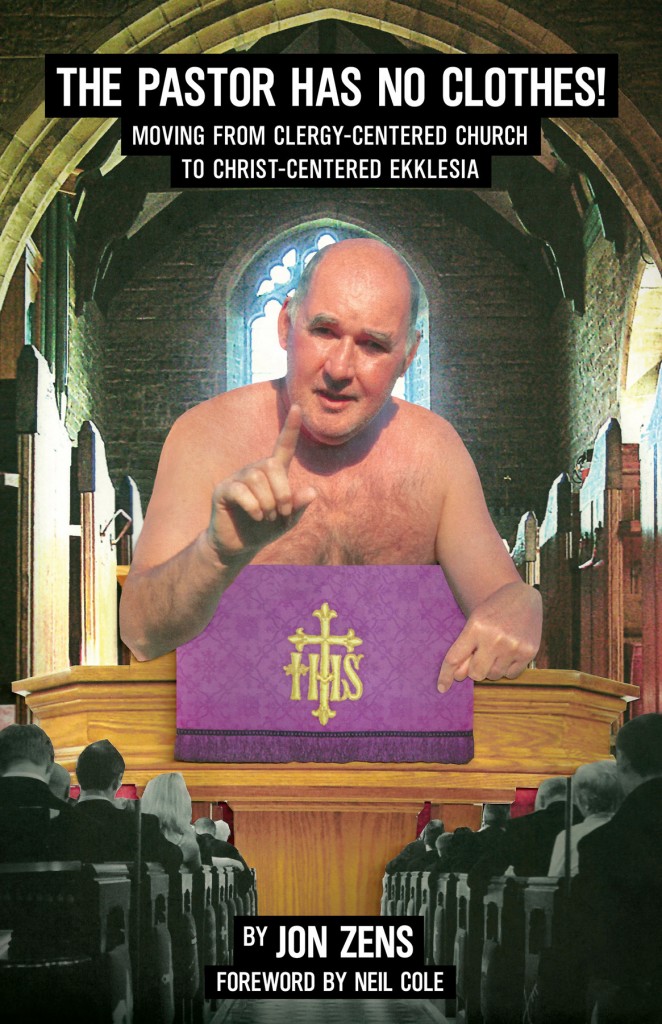I don’t know what reasons #1 and #2 are, but I know this one ranks way up there. As Frank Viola pointed out in Reimagining Church, there is one source that for sure impedes God’s purposes in Christ – human traditions. One tradition that has a stranglehold in most of what calls itself “church” is the notion that the buck stops with “the pastor.” This so-called “office” is, as was unfolded in chapter five of Pagan Christianity, the biggest “obstacle to every-member functioning.” As this all works out, then, the expression of Christ is supposed to come from one person’s input, and the Life of Christ residing in the rest of the body remains essentially dormant, with no outlet.
Now, most pastors would never put what follows in writing, but a Baptist pastor in Tyler, Texas, did. Here’s what appeared in a 1989 Sunday church bulletin:
HOW TO ADDRESS A PASTOR. It was the first class for Government at East Texas State University. I observed the instructor as he entered the room. He walked to the blackboard where he wrote his name. He turned to the class and said, “That is my name. You may call me Mister or Professor, but never call me by my first name.” I never did call him by his first name, though he was my junior.
The Pastor should not be called by his first name for the same reason. At times, first names can be fitting and appropriate, but not for your parents, nor for judges, not for law officers, nor for preachers. It is a matter of respect for the position and office. A pastor may be called Bishop, Elder, Pastor, or Brother. Ananias addressed Paul as “brother” in Acts 9:17. How very true the statement, “Familiarity breeds contempt.” Refraining from calling a Pastor by his first name does not mean he is more spiritual than his flock, but it does mean he holds the highest office in the church, namely that of God’s undershepherd, which demands respect as seen in Hebrews 13:24.
The Pastor should never be called by the title of “Reverend.” That is God’s name as recorded in Psalm 111:9, and it refers to God’s holiness. Pastors have no holiness except imputed holiness. (Dan W. Cozart, Grace Baptist Church bulletin, January 8, 1989)
This is the mostly unwritten way that pastors view themselves, and the people view their leaders. But in this sentiment, and the assumptions upon which it is based, we have set in front of our eyes clearly and unequivocally Reason #3 why Jesus Christ is silenced from expressing Himself through all of His body in most church buildings.
How can Jesus Christ flourish when everyone is on a first-name basis – except the preacher?
How can Jesus be pre-eminent when there is such a focus on one person’s highest position, title, and official authority? Titles bring division among the brothers and sisters by unduly elevating those who can’t be called by their first name.
How can fellowship in the Son be a reality in an atmosphere where one person must remain aloof from the others, lest familiarity breed contempt? The clergy-laity system insulates “the pastor” from the flock. He can’t really have close friends in the church. So he must go away to conferences for pastors/leaders to find camaraderie, and it may rarely be found even in those professional venues.
Where does the New Testament say that the pastor “holds the highest office in the church”? There are no “offices” in the ekklesia. Rather, everyone has “a manifestation of the Spirit” for the full edification and nourishment of the body. Paul clearly stated that “the body is not one part, but many.” But when someone occupies an alleged “highest office,” it paints a picture to watching eyes that the body is dependent on one part, not many. The fullness of Christ is in and through all the body parts together; one body part is merely one part, and nothing more.
The fragrance of Christ evaporates when more respect is demanded for titles and positions than for all the other body parts. In his church bulletin, the official leader stated, “The Pastor should never be called by the title of ‘Reverend.’ That is God’s name.” Yet, by his demand for respect from the rest of the body of Christ because of his high position, he is by his own admission demanding the very reverence which he affirms belongs to God alone.
Emphasis on leaders with titles creates a lifeless hierarchy, with people walking on eggshells, lest they breed contempt because of an inappropriate level of familiarity. Respect and honor are extremely important in the body of Christ, but not based on offices and titles, but on the aroma of Christ exuding through the lives of all the parts. In fact, Paul insists that honor should be bestowed especially on the weaker and seemingly less honorable persons in the body. Where do you see the reality of this being worked out? You can mark it down as a surety – wherever respect is demanded for the few in “office,” Christ’s life in relational community will not be present.
The fact that a traditional pastor felt compelled to express himself in such terms is proof in itself of how far we have drifted from the simplicity of Christ. We have created a religious monster where being “over” others is the name of the game. It’s not about gathering around the lovely person of Christ, but about religious leaders controlling “the flock.” It’s not about Christ guiding His sheep; it’s about those in the “highest office” having the final word. One evangelical denomination put out a position paper that underscored what a sin it is to question the pastor, and told its members to just leave quietly if they didn’t go along with the pastor’s vision/teaching. This is not Christ, but fleshly religion.
Traditional Christianity has said, “respect those in office who are over you, or else.” Jesus said, “not so among you, for you are all brothers and sisters.” The Lord God said out of the cloud, “This is my beloved Son, hear Him.” There is little evidence that we have listened.
Jon Zens, October, 2012
Along these lines, check out Jon’s previous blog, “The Body with One Part?”
[For an in-depth presentation that unravels the idea that The Pastor is “the highest office in the church,” check out Jon’s The Pastor Has No Clothes: Moving from Clergy-Centered Church to Christ-Centered Ekklesia]



 Author, speaker, editor of Searching Together, itinerant encourager of relational communities.
Author, speaker, editor of Searching Together, itinerant encourager of relational communities.
Very true spot on blog. We are all sibling peers in the body of Christ.
The only hierarchy in the true church is that Jesus is King and no one else.
http://notesfromthebridge.wordpress.com
Thanks for that post, Jon.
I like the fact that you always write with such clarity and after thorough study. The arguments you make here need to be heard often, until they soak deep into our hearts and minds.
It’s so very simple, Jesus is the Head – in everything. Why do we find that so hard to grasp?
This issue of respecting some over others evaporates quickly when viewed from the reality that we are “in” Christ. Therefore we no longer regard one another from a earthly, or human perspective. Living in and by the indwelling presence of Christ enables us to treasure one another, as we treasure the Treasure we see in one another.
Thanks Jon!
A thought regarding the common reasoning that says, or proclaims, that they are a servant to the people of God. They imply that they are not a leader at all, but a humble servant to God’s people. But, in accordance to the eternal will and pleasure of God, since before the foundation of the world, we as His body are to express Christ, live Christ, who is our Life. And it is the administration of the mystery, which is Christ in us, who governs the ekklesia from within us, Christ is the Kingdom reign. If we have only one expressive body part when we come together, then we are in violation of the eternal purpose of God in Christ. A gathering of the saints, the body of Christ, is not a performance, not an audience, not a preaching to the unbelievers, it is Christ’s body coming together for, through, to and in Christ for His expression alone. The body consists and expresses with all the parts; if one part is given the expression over and/or in exclusion to all the other parts, then how could that be serving the people whose expression of Christ is then silent? Who speaks for all the people, a servant or a leader/king? Though a leader can be humble, does the body of Christ need a leader other then Christ Himself, the source/head?
The “freedom” that Christ came to set us free, is actually by the Authority of Christ who dwells in us; He is the Kingdom reign. It is only those without Christ in full Authority who are not free! Christ set us free to be free! He is the only freedom. And, when we give someone else the authority over us, the position of authority of our growth into Christ, into the House of God and the fullness of Him, which is the transformation work of Christ in us, then we are not free, but in utter bondage.
I agree with all you said Jon, but, it will take millions of years before the Universal Church changes. Am a full preterist, and from what I am seeing, things won’t change for a long time, unless, the house church movement becomes a worldwide revival. The pastor-pulpit-sermon-building structure is too ingrained in the Universal Church. Maybe when we move to mars, we will have a really organic expression of the Church. But now, the Divine Stream is focused on the Supremacy of Christ, church life maybe for the next fourth generation. Sincerely, Rafi.
I just listened to your interview with Bob Dutko, where he kept insisting that a pastor is needed based on the poll that 57% of confessing Christians believe that there can be another way to God than Jesus. I kept shouting ” and what kind of churches do all these go to? The kind with a pastor to keep them from error? How’s that working out for ’em”?
Looks to me to be another form of law vs. grace. Make sure the Law is in place…..
Good points, Jerry! It is pretty clear that just having “the pastor” in place is not keeping churches out of error.